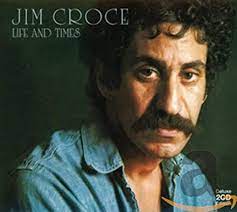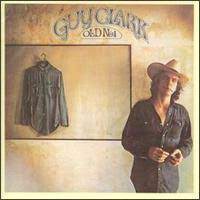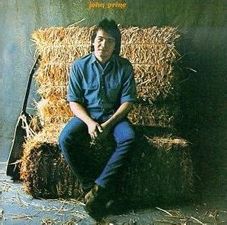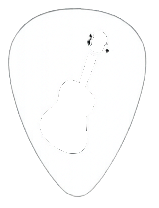Play These Neil Young Songs on Acoustic Guitar
Neil Young’s songs are rich with acoustic texture, storytelling, and raw emotion—and that’s exactly why they’re so rewarding to play on guitar. This page features 27 handpicked lessons that span his career, from the early hits like “Cinnamon Girl” and “After The Gold Rush” to deeper cuts like “Thrasher” and “Old King.”

Each lesson includes a chord breakdown, rhythm tips, and a video snippet demo.
Whether you’re learning “Heart of Gold” or “Like a Hurricane,” you’ll find a blend of timeless songs and thoughtful instruction to help you play them confidently on acoustic guitar.
🎸 Overview Video - “Watch This Preview of My Best Neil Young Guitar Songs”
🎁 Free Lesson
Want to see a free lesson? Scroll down to check out a completely free lesson on Neil Young’s “Heart Of Gold”
🎁 Free Lesson Preview
Want to see a full demo? Scroll down to check out a completely free demo on Neil Young’s “Helpless”
Neil Young Guitar Lesson Titles
After The Goldrush
Cinnamon Girl
Comes A Time
Cowgirl In The Sand
Don't Let It Bring You Down
Four Strong Winds
Harvest
Harvest Moon
Heart Of Gold
Helpless
Hey Hey My My
Human Highway
In The Days That Used To Be
Like A Hurricane
Long May You Run
Ohio
Old King
Old Man
Out On The Weekend
Powderfinger
Sugar Mountain
Tell Me Why
The Loner
The Needle And The Damage Done
Thrasher
Tonight's The Night
When You Dance I Can Really Love
1. After The Goldrush - Learn To Play On Guitar
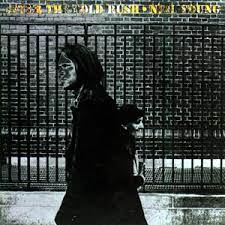
After The Goldrush hails from the album of the same name from 1970. The song was never released as a single but was covered by Emmylou Harris, Dolly Parton and Linda Ronstadt on their Trio album.
Natalie Merchant, KD Lang and Patti Smith have also covered this song.
Chords And Strumming
I play this one in standard tuning with a bit of lead blended into the lesson. I use a 1-2-3 arpeggio up down up and repeat rhythm pattern with the chords D, G, A, Bm and a C.
Guitar Lesson Details - (chords & lyrics sheet incl with lesson)
Back To Song List
2. Cinnamon Girl - Learn To Play On Guitar
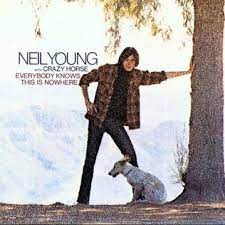
Cinnamon Girl was a 1969 Neil Young release from his debut album with his band Crazy Horse from the album "Everybody Knows This Is Nowhere". This song was one of three singles from the album and Neil was battling the flu at the time of writing.
The song reached #55 in the US and #34 in Australia.
Chords And Strumming
The chords you'll need here are D, F, G, Am, C, Am7 and Dm with drop D tuning. For rhythm I play a down up down up and repeat with various accents and down strokes when blending in riffs so there is a bit of picking into the rhythm.
Guitar Lesson Details - (chords & lyrics sheet incl with lesson)
Back To Song List
3. Comes A Time - Learn To Play On Guitar
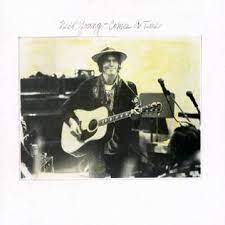
Comes A Time was also from the 1978 album of the same name but this one was released as a single. Apparently the original mix of this album was unsatisfactory due to a master tape being damaged during shipment, but a master copy was fine.
So Neil purchased 200,000 copies of that first batch and used them a shingles on a barn roof. He-remixed the version which most have heard today.
Chords And Strumming
There is some lead work in this song while playing a root down root up down and repeat rhythm pattern while in standard tuning. The chords needed are G, C, Bm, D, Am ans an F.
Guitar Lesson Details - (chords & lyrics sheet incl with lesson)
Back To Song List
4. Cowgirl In The Sand - Learn To Play On Guitar
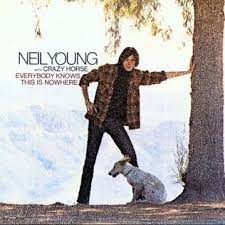
Cowgirl In The Sand hails from the same 1969 album as Cinnamon Girl above and that is the "Everybody Knows This Is Nowhere"album.
CSNY have covered this song as have The Byrds. This song was never released as a single.
Chords And Strumming
I like to play a down down down up, up down up down down up and repeat rhythm pattern. There are accent changes as well which you'll have to feel out and some lead required in standard tuning. The chords for this are Am, F, C, G, Dm, Em and an Fmaj7.
Guitar Lesson Details - (chords & lyrics sheet incl with lesson)
Back To Song List
5. Don't Let It Bring You Down - Learn To Play On Guitar
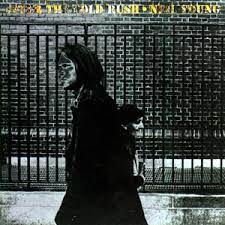
Don't Let It Bring You Down hails from the 1970 "After The Goldrush" album.
The song was never released as a single but has been covered by more than a dozen artists.
Chords And Strumming
The chords here are D, C/F, C, G, G6, D/A#, Am7, G7 and Em with drop D tuning. A steady down down up down up down, down up down up down up and repeat rhythm pattern needed here with some chops in the rhythm in standard tuning.
Guitar Lesson Details - (chords & lyrics sheet incl with lesson)
Back To Song List
6. Four Strong Winds - Learn To Play On Guitar
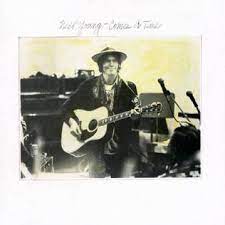
Four Strong Winds was recorded by Neil Young back in 1978 for his "Comes A Time" album.
Four Strong Winds and Comes A Time were the only two singles from this album. It peaked at #18 in Canada and #57 in the UK.
Chords And Strumming
Played in standard tuning with a little picking blended in, use the chords C, Dm, G and F with a root down up down up down up rhythm pattern.
Guitar Lesson Details - (chords & lyrics sheet incl with lesson)
Back To Song List
7. Harvest - Learn To Play On Guitar
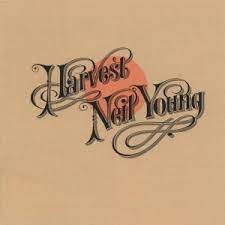
Harvest as a 1972 album released by Neil Young and contained this song of the same name. This particular track was not released as a single but the album shot to the top of the Billboard Charts as best selling album of 1972.
Neil wanted the album jacket to be biodegradable after the shrink wrap came off, but he was over-ruled by the record company due to the extra costs.
I play this one with drop D tuning with some lead and a root down up root up down up and repeat rhythm pattern. For chords you'll need D, A, G, Bm and E7.
Chords And Strumming
I play this one with drop D tuning with some lead and a root down up root up down up and repeat rhythm pattern. For chords you'll need D, A, G, Bm and E7.
Guitar Lesson Details - (chords & lyrics sheet incl with lesson)
Back To Song List
8. Harvest Moon - Learn To Play On Guitar
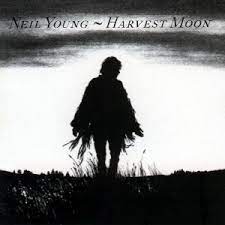
Harvest Moon was also from the "Harvest Moon" album released back in 1992. The peaked in Canada at #5 but never charted in the US but reached #36 in the UK.
The song was a tribute to his late wife Pegi. Linda Ronstadt sang backup vocals on this track.
Chords And Strumming
Another one with drop D tuning with the chords D, G, Em, Dmaj7, D/B, A and A7. For rhythm play a root down root up down up and repeat pattern with some lead.
Guitar Lesson Details - (chords & lyrics sheet incl with lesson)
Back To Song List
9. Heart Of Gold - Learn To Play On Guitar
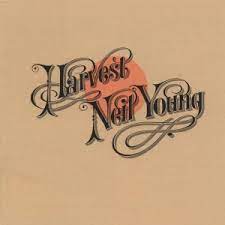
Heart Of Gold is featured on Neil Young's album titled "Harvest," released in 1972. The album is regarded as one of Young's most successful and influential works.
The song was written by Neil Young himself. He composed it during a time when he was recovering from a back injury and experiencing a bout of flu. The lyrics reflect his feelings of introspection and the search for something genuine and meaningful.
"Heart of Gold" was released as a single and achieved significant chart success. In the United States, it reached the number one spot on the Billboard Hot 100 chart in 1972, becoming Neil Young's only song to achieve that feat. It also reached the top spot on the Canadian RPM Top Singles chart.
Chords And Strumming
I play this one in standard tuning with the chords G,
Em, C and D. The
rhythm on this one is a bit choppy with down-strokes, mainly for the
harmonica section. But it gets a bit complicated while trying to blend
in the harmonica parts. Once you get to the singing sections you can
play a down down up down up and repeat
There are three breaks in this song. The intro and two during the song. And it's following a bit of the singing melody pattern. Hopefully you can follow the lesson instruction. If you want, you can pick the pattern that is easy and just duplicate it several times.
Guitar Lesson Details - (chords & lyrics sheet incl with lesson)
Back To Song List
10. Helpless - Learn To Play On Guitar
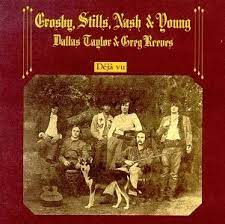
Helpless was written by Neil Young and released in 1970 while he was part of Crosby Stills Nash and Young from their "Deja Vu" album.
The song was never released as a single.
Chords And Strumming
A down down up down down up and repeat rhythm pattern will work here in standard tuning with the chords D, A and G. Some lead work required.
Guitar Lesson Details - (chords & lyrics sheet incl with lesson)
Back To Song List
11. Hey Hey My My - Learn To Play On Guitar
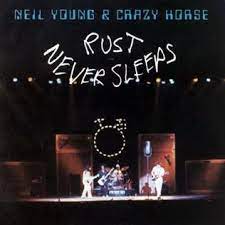
Hey Hey My My hails from the 1979 album "Rust Never Sleeps" and was the only single release from the album.
The song peaked at #79 on the Billboard Hot 100 charts.
Chords And Strumming
I play this song in standard tuning with some lead blended into the rhythm. I play a down down up down up down up and repeat rhythm with some riffs using the chords Am, G, Fmaj7, C and Em.
Guitar Lesson Details - (chords & lyrics sheet incl with lesson)
Back To Song List
12. Human Highway - Learn To Play On Guitar
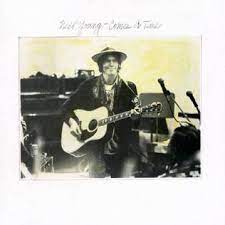
Human Highway can be found on the 1978 "Comes A Time" album. Young presented the song a few years earlier to CSNY but apparently they didn't want to record it.
The song was never released as a single.
Chords And Strumming
Some lead needed here in standard tuning with the chords G, C, Em, D and Bm. Play a root down root up down up and repeat rhythm pattern.
Guitar Lesson Details - (chords & lyrics sheet incl with lesson)
Back To Song List
13. In The Days That Used To Be - Learn To Play On Guitar
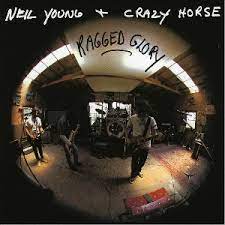
In The Days That Used To Be is on the 1990 album "Ragged Glory".
The song was never released as a single and the album peaked at #31 on Billboard.
Chords And Strumming
Play this song with a down up down up pattern and in a few places use a double down stroke pattern while in standard tuning. Some lead required with the chords G, C, Bm, G6, Am, D, D/Gb, Em and F.
Guitar Lesson Details - (chords & lyrics sheet incl with lesson)
Back To Song List
14. Like A Hurricane - Learn To Play On Guitar
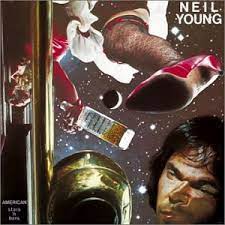
Like A Hurricane hails from the album "American Stars N Bars" from 1977.
This song was a single but only charted in the UK at #48.
Chords And Strumming
I play this one in standard tuning and have a little picking in the rhythm. The chords are Am, G, Fmaj7, Em, C, and F with a down up stop up down up stop up rhythm pattern.
Guitar Lesson Details - (chords & lyrics sheet incl with lesson)
Back To Song List
15. Long May You Run - Learn To Play On Guitar
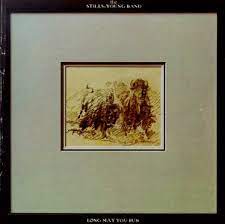
Long May You Run is credited to the Stills Young band of 1976 as CSNY were on separate career paths with David Crosby and Graham Nash working together and Young and Still on separate projects.
Long May You Run was recorded during the summer of 1976 and released in the fall. After 9 dates on tour with Stephen Stills, Neil Young dropped out of the duos tour to promote the album. The song was released ahead of the album and peaked at #71 in the UK.
I'm giving credit as a CSNY song as the four of them have performed the song many times together.
Chords And Strumming
Another I play in standard tuning with a root down root up down up and repeat rhythm pattern and some lead required. The chord you'll need are D, Dmaj7, G, Bm, A7, A7sus, A, A# and C.
Guitar Lesson Details - (chords & lyrics sheet incl with lesson)
Back To Song List
16. Ohio - Learn To Play On Guitar
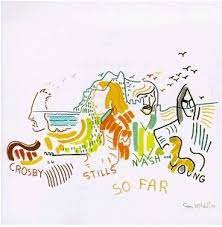
Ohio was a protest song written by Neil Young after seeing photos in Life Magazine of the May 1970 Kent State shootings in which four university students lost their lives. They rushed the recording and had the song on the airwaves by June of 1970.
Some radio stations refused to play song and the Nixon Administration were not too happy about the recording. It was the only single from the "So Far" album and peaked at #14 in the US.
Chords And Strumming
Drop D tuning is used here with a few riffs using a root down root up down up rhythm pattern and the chords D, F/G, C, Gm and Dm.
Guitar Lesson Details - (chords & lyrics sheet incl with lesson)
Back To Song List
17. Old King - Learn To Play On Guitar
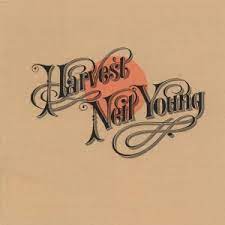
Old King is a track from the 1992 Harvest album.
The song was never released as a single.
I also use Drop D tuning here with some lead and a root down up root up down up rhythm pattern. The chords for this one are D, G, C and F.
Chords And Strumming
I also use Drop D tuning here with some lead and a root down up root up down up rhythm pattern. The chords for this one are D, G, C and F.
Guitar Lesson Details - (chords & lyrics sheet incl with lesson)
Back To Song List
18. Old Man - Learn To Play On Guitar
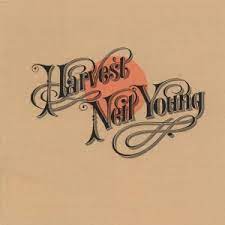
Old Man has two famous artists as backup singers and they were James Taylor and Linda Ronstadt.
Both had appeared on the Johnny Cash Show, along with Neil.
Chords And Strumming
I have the guitar tuned down two frets for this lesson and use a few riffs for lead. The chords here are D, C(add11)/D, F, G, Am7 and Em with a down down up down up and repeat rhythm pattern.
Guitar Lesson Details - (chords & lyrics sheet incl with lesson)
Back To Song List
19. Out On The Weekend - Learn To Play On Guitar
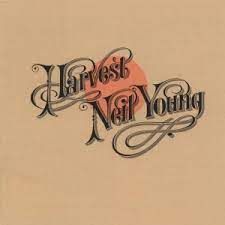
Out On The Weekend was not a single from the 1972 "Harvest" album but is the opening track from the album.
One critic said the song would have been a hit had it been released as a single.
Chords And Strumming
Another song with drop D tuning that has some picking in the rhythm with the chords Am, D, Bm, E7, G and Dsus with a capo 2nd fret. Play a down down up down up and repeat rhythm pattern.
Guitar Lesson Details - (chords & lyrics sheet incl with lesson)
Back To Song List
20. Powderfinger - Learn To Play On Guitar
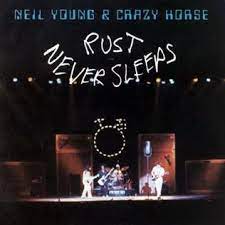
Powderfinger hails from the 1979 album "Rust Never Sleeps".
Even though the song was never a single, in 2014 Rolling Stone said in their opinion, it was Neil Young's greatest song.
Chords And Strumming
For chords here play E, A, B and Abm with no picking required and in standard tuning. The rhythm pattern needed is a down down down up down up and repeat.
Guitar Lesson Details - (chords & lyrics sheet incl with lesson)
Back To Song List
21. Sugar Mountain - Learn To Play On Guitar
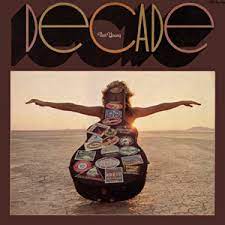
Sugar Mountain wrote this song when he was 19 yrs old and the song originally had 126 verses. He managed to bring it down to four eventually but even tho his first demo was in 1965 and the the first recording was back in 1968 along with "The Loner", it never appeared on an album until 1977 which was the "Decade" album.
The song did not chart as a single.
Chords And Strumming
Played in standard tuning with a root down root up down up or use a root up down up root up down up rhythm pattern. Some lead in the rhythm with the chords D, C, G, Fmaj7 and Dm.
Guitar Lesson Details - (chords & lyrics sheet incl with lesson)
Back To Song List
22. Tell Me Why - Learn To Play On Guitar
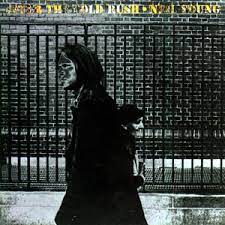
Tell Me Why hails from the album "After The Goldrush" from 1970. This song was performed by CNSY live a few times before the album release during that year.
Nils Lofgren and Neil play acoustic guitars only on this track with every string tuned down a whole step.
Norah Jones and Radiohead have covered this song.
Chords And Strumming
I play it in standard tuning with some picking in the rhythm which is a root down root up down up and repeat pattern with the chords G, C, D, Am, Gmaj7, Em and Bm.
Guitar Lesson Details - (chords & lyrics sheet incl with lesson)
Back To Song List
23. The Loner - Learn To Play On Guitar
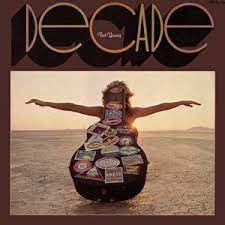
The Loner hails from Neil Youngs debut album from 1969, where four singles were released, including this song, and non of them charted.
In fact in Neil Young's long solo career, he only had one #1 song in Canada and the US and it was "Heart Of Gold".
Chords And Strumming
The chords need here are F, G, C, D, Gm, Am and a Dsus in standard tuning and no lead required. For rhythm play a down down up and repeat patten but this one has a few choppy parts and down strokes and some shuffle strumming in parts throughout the song.
Guitar Lesson Details - (chords & lyrics sheet incl with lesson)
Back To Song List
24. The Needle And The Damage Done - Learn To Play On Guitar
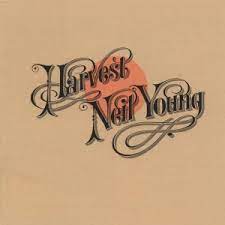
The Needle And The Damage Done appeared on the "Harvest" album from 1972 and on other albums later on.
Our Lady Peace, Duran Duran and The Pretenders have all covered this song.
Chords And Strumming
A few riffs in this lesson with a 1-2-3 arpeggio up down up down up and repeat rhythm pattern in standard tuning. For chords play D, C, D/B, D/A+, F, Esus and E.
Guitar Lesson Details - (chords & lyrics sheet incl with lesson)
Back To Song List
25. Tonight's The Night - Learn To Play On Guitar
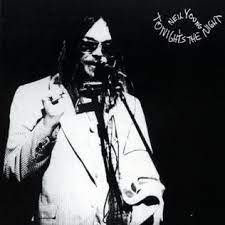
Tonights The Night was Neil Young's sixth studio album which was released in 1975 but mostly recorded in 1973.
No singles were released from the album.
Chords And Strumming
Drop D tuning is this song with a few riffs in the rhythm using the chords D and C. Ply down strokes with muted strings for rhythm.
Guitar Lesson Details - (chords & lyrics sheet incl with lesson)
Back To Song List
26. Thrasher - Learn To Play On Guitar
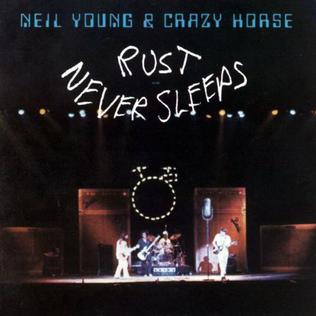
Thrasher is a track from Neil Young's 1979 album "Rust Never Sleeps". Neil said he wrote this song during the filming of the movie Human Highway, which was released a few years later in 1982.
He was sitting in the front seat of a car in New Mexico and the lyrics and everything about the song just came to him as he was reflecting on his life.
Young never performed the song for many years because of a critics harsh review, but in time, he got over it and started playing the song live.
Chords And Strumming
I play this song with a capo 2nd fret and in standard tuning. For rhythm just play a down down up down up down up and repeat. For chords you'll need a C, F, G6, Am, G and Dm7. This is a little bit of lead near the end that is blended into the rhythm.
Guitar Lesson Details - (chords & lyrics sheet incl with lesson)
Back To Song List
27. When You Dance I Can Really Love - Learn To Play On Guitar
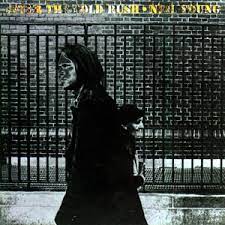
When You Dance I Can Really Love is found on the 1970 album "After The Goldrush". There was a title misprint and someone swapped the I for the word You.
The song peaked at #93 on the Billboard Hot 100 in 1971.
Chords And Strumming
The rhythm needed here is down up pause down down up down up with down strokes also mixed in in standard tuning. A few riffs in the rhythm using the chords D, C, G, A#, Dm, F and Am.
Guitar Lesson Details - (chords & lyrics sheet incl with lesson)
Back To Song List
Common Neil Young Questions
1. How many number one songs did Neil Young have?

Neil Young, despite his significant influence and long-standing career in rock music, has never had a number one hit on the US Billboard Hot 100 singles chart. This might be surprising given his status as a music icon
While he didn't reach number one, Young did have several songs that charted well. His highest-charting single was "Heart of Gold," which reached number 1 on the Billboard Hot 100 in 1972.
2. What made Neil Young famous?
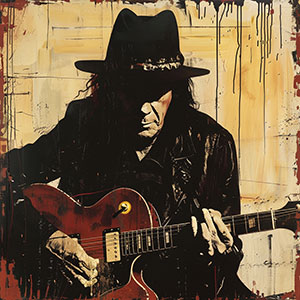
Neil Young became famous for writing and singing great songs that people have loved for many years. Young's music has been popular from the 1960s all the way to today. What's really cool is how he influenced different types of music.
The "Godfather of Grunge" as a good title for him because bands like Nirvana and Pearl Jam in the 1990s were inspired by his raw, guitar-heavy sound.
Young is also famous for speaking up about things he believes in through his music. He's known for changing his style and trying new things, which has kept fans interested for decades. His unique voice and honest lyrics have made him a legend in rock music.
3. How rich is Neil Young?
His net worth is estimated to be at $200 million dollars.
4. Why Did Spotify remove Neil Young?

Neil Young’s catalogue is as deep as it is iconic—and this collection of 27 lessons offers both his greatest hits and hidden gems. Whether you’re strumming “Harvest Moon” on a quiet evening or rocking through “Powderfinger,” these arrangements make it accessible to any intermediate acoustic player.
Check out other classic rock or singer-songwriter pages on the site for more guitar inspiration, or grab a few of these full lesson packs to deepen your skills. Thanks for exploring Neil Young’s music with us.
If you liked this best Neil Young guitar songs page you might also like ... (click images)
Neil Young & CSNY Documentary
Fun Folk Songs To Sing
